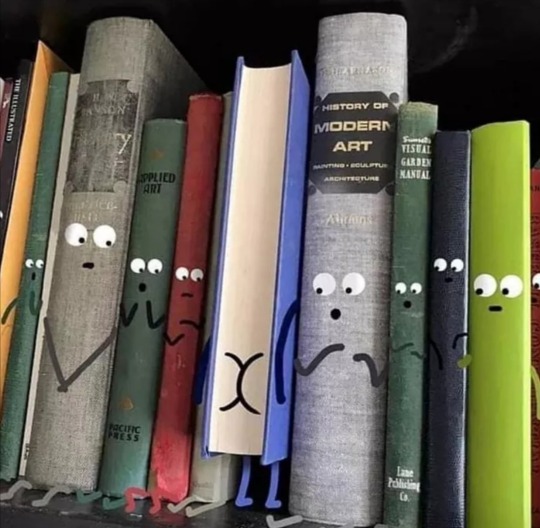Text
What Once Was Mine: a Twisted Tale's Book Review
It took me quite a long time to finally sit down and review this book — mostly because I was in denial — but here I am at last. So, let's talk about What Once Was Mine, shall we?
Personally, Tangled is one my favourite Disney movies. I can relate a lot to Rapunzel, who grew up trapped in a tower by her abusive stepmother. Her curiousity about the outside world, her restlessness, her feelings of guilt and her need to constantly search for new things to occupy herself with, make me feel represented as a survivor of domestic abuse myself. So you can imagine my excitement when I stumbled upon this book. I have read some of Liz Braswell's previous works on the Twisted Tales series, so I naturally had high expectations for this one.
However, What Once Was Mine was quite the disappointment. My main issue with it is that on contrary to the other volumes on the series — at least those which I've read — the idea behind it is not that original. The Twisted Tales series present to us, readers, a new take on these classic fairy tales. They bring a new twist to the table — as we can see on A Tale as Old as Time. And although we are familiar with the possibility of Rapunzel's power being used for evil or to serve other purposes besides healing (I'm talking about the Hurt Incantation) I expected Braswell to explore it further. For the most part of the book, I felt like I was reading the movies' script: the conversations were the same, the plot was the same, the order of events was the same. Because of that, I quickly got bored of it and was unable to enjoy it as I wish I could've.
The second thing I would like to point out is that Gothel is not the main villain. For me, this didn't make any sense because since the beginning she's introduced as this antagonistic character who, for selfish, narcissistic and superficial motives, kidnaps Rapunzel and locks her away from the rest of the world in order to keep her powers to herself. Gothel's actions should've built up to something, they should've make us feel fearful of what she would do next. But instead, she's pushed aside and we get another villain, who appears out of nowhere and who we know nothing about. Why would you erase an already well-developed antagonist and choose a random one instead in the last third part of the book? I will not be spoiling who it is, but for the sake of this review I will disclose that it's a queer-coded villain, which for obvious reasons just didn't sit right with me.
Despite everything I mentioned above, there were in fact some aspects I really liked, such as the historical setting of the story, for example, and the existence of witches. I appreciated the focus on the role of the midwives at the beginning and the fact that Gothel pretended to be one — which then again just shows how she unreservedly lies to obtain everything she wants. I also liked seeing Rapunzel explore her powers, how she used them in her own unique way, and the concept behind it, but as I mentioned before Braswell didn't describe them as well as I would've liked and it was overall a bit predictable.
I absolutely loved Gina. I think she was the better character in the book, and I specially liked how she wasn't afraid to point out to Rapunzel that she was very privileged in comparison with orphans like Gina and Flynn who lived in poverty and had to go through many difficulties back at the orphanage.
I rated this book 3 stars, because unfortunately it was not my cup of tea, although I understand how others can enjoy it regardless of its faults.
#bookworm#readmorebooks#bookstagrammer#booklover#booksofinstagram#booknerd#bookcommunity#book haul#books and literature#readersofinstagram#long book review#book review#the book chaos book reviews#rapunzel#tangled#tangled series#disney#disney Rapunzel#twisted tales#twisted#plot twist#hurt incantation#flynn rider#flynn#gina#mother gothel#gothel#midwives#What Once Was Mine#liz braswell
7 notes
·
View notes
Text
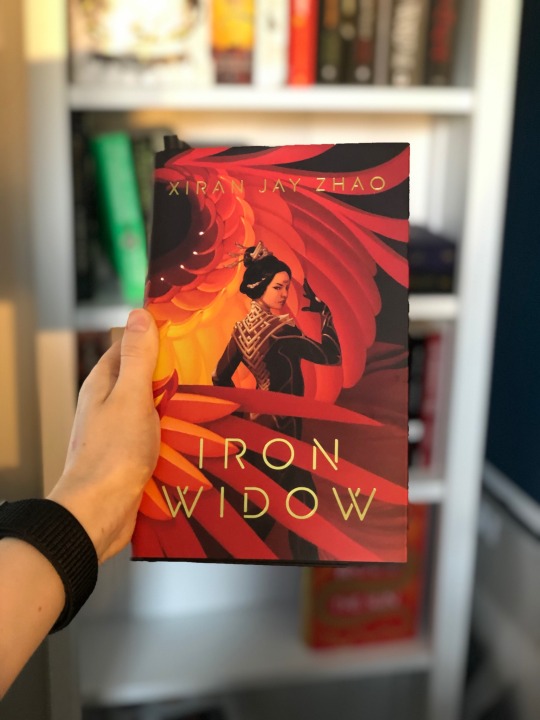
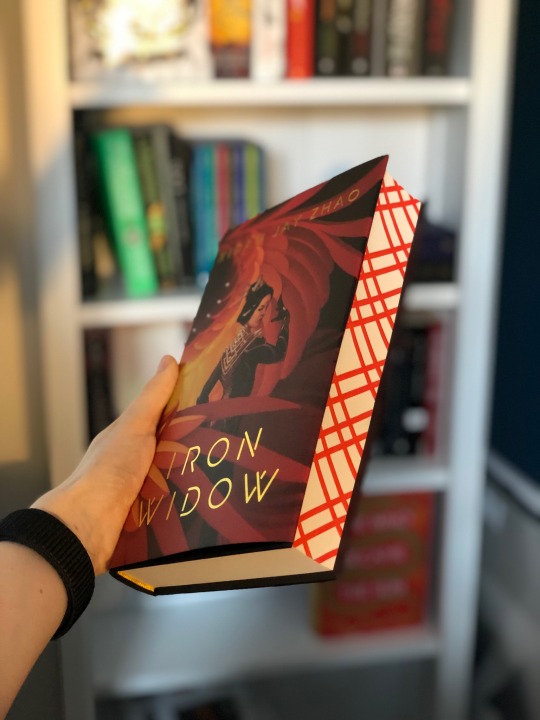
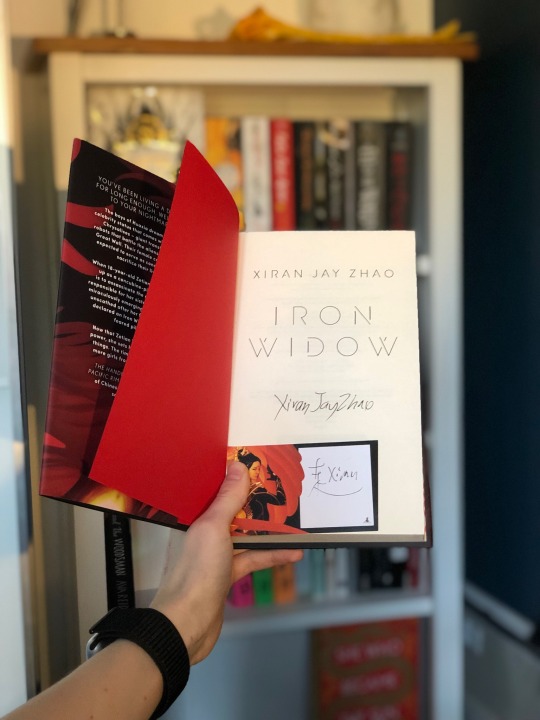
Beautiful Illumicrate edition of Iron Widow here, a Chinese inspired Science fiction, with a F/M/M polyamorous relationship between the main characters.
126 notes
·
View notes
Text

“and Ronan was everything that was left: molten eyes and a smile made for war”
– The Dream Thieves, Maggie Stiefvater
35 notes
·
View notes
Photo
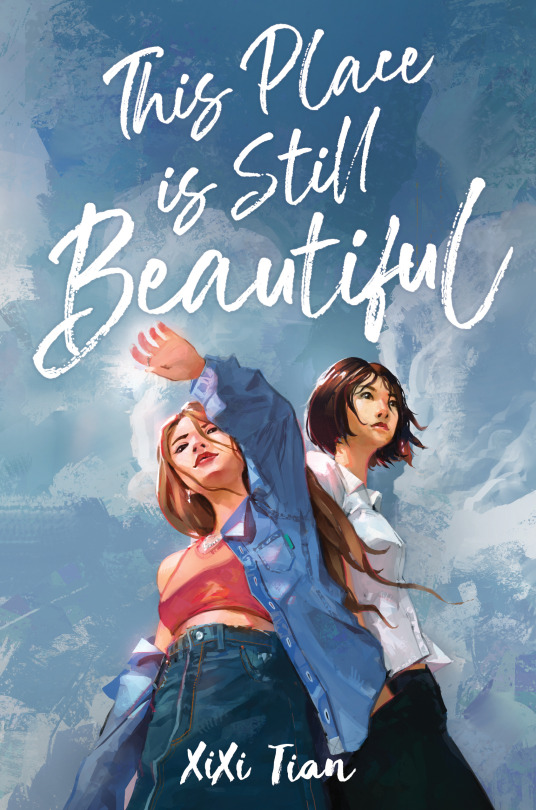
Not yet reading because it doesn’t come out until June 7, 2022: This Place Is Still Beautiful by XiXi Tian
Hi! Remember when I said my friend (and fellow fic author!) XiXi was publishing a book? Well, THE COVER IS HERE and it is GORGEOUS and I’m doing my part as an unofficial one woman hype team to get it in front of as many eyeballs as possible because she (and this book) deserves it!
If you love YA contemporary lit with a focus on sisters, summer love, and some heavier themes of identity and racial justice, put this on your reading list right now. I promise you won’t be disappointed!
Pre-order (US): https://bit.ly/3lD7Osz
Pre-order (UK): https://bit.ly/3p0qlkw
Goodreads: https://bit.ly/3iZHjM2
117 notes
·
View notes
Text
Telling an author, a Black author at that, that she should not write retellings that are more inclusive and instead come up with original ideas is racist. Where do you as a white person/woman get off telling anyone to be original? Please answer that. Cuz you see, we have original stories. Black, Asian, Indigenous, or any member of the global majority. We got enough originality to last freaking eons. You don’t. You won’t read ours either though.” Be more original” Show me the receipts baby. Show me exactly what books you’ve bought in the last few years that are originals by authors of the global majority. Matter of fact, name some new releases. Bet you can’t. Got the nerve to sit there and compare a book to Harry Potter when it’s nothing like Harry Potter. Then gon tell another author “Oh I think more people would buy your book if the love interest is white.” How dare you?! We give you originality and you rake it through the mud! All cuz you don’t like the fact that you’re not the main character and you don’t understand what’s going on. GOOGLE IS FREE! All the adaptions and retellings of freaking Little Women and you get mad at a Black woman for doing the same thing?! Little Women is boring! Let there be retellings with characters that are actually going to be interesting! Nobody feels like seeing or reading the same thing!
Aaaand of course she deleted the tweet but thankfully ppl got screenshots. Ion know if this is THEE tweet but…it’s a hot mess. That’s what it is.
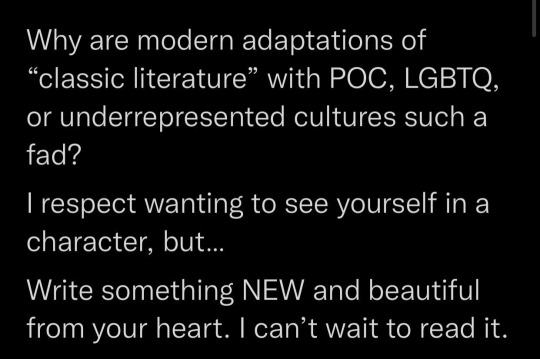
“I respect wanting to see yourself in a character “ No you don’t! We’ve literally been force fed your literature for centuries! Y’all still won’t let us make our own stuff either. Worried about it making white people uncomfortable or it being too “ethnic”. It always has to be by your standards which happen to be complete trash. If we wanna put a twist on the so called “classics” and be more inclusive then we have every right to.
220 notes
·
View notes
Text
Jason : Today I saw Nico crying for about five minutes and then an alarm went off and he just stopped crying and went right back to work
Nico : It's called time management
808 notes
·
View notes
Text
‘The Duke and I’ and Why It’s So Problematic: an Extensive Book Review.
Before reading, please keep in mind that this review contains spoilers.
Trigger Warning: Sexual assault, r*pe, sexism, child abuse and neglect, racism.
Please note that English is not my first language, so you might notice some mistakes.
Contents
The netflix's tv show, Bridgerton.
The original work: "The Duke and I", by Julia Quinn.
Where art thou, diversity?
Sexism isn't sexy.
The r*pe scene.
When I first heard about a new Netflix series with a diverse cast and a black love interest, I was overjoyed. I'm completely obsessed with historical dramas, even more so when the characters aren't all white. So you can imagine my excitement when they hinted at a racially integrated London, in which black people were part of high society. I was looking so forward to it, that I literally watched it as soon as it was released.
However, of course we're not that lucky. They were afraid of the power we could have had after watching a diverse historical drama with gender equality. They were so afraid that they ruined it.
But let's stop with the small talk and dive right into this mess, shall we?
The Netflix's TV Show, Bridgerton.
For those who might not be familiar with it, Bridgerton is a historical drama set in Regency era London and it follows an aristocratic family, the Bridgertons, and their social life during London's Courting Season. Although said family consists of nine people — the widowed mother, Violet, and her eight children —, it mainly revolves around Daphne, the fourth child and the eldest daughter.
Daphne enters the season as a debutante ("an upper-class woman, making her first appearance in fashionable society", according to Google) who's looking to secure a good match. In order words, our girl is looking for a husband. However, she hasn't been very successful.
At the same time, Simon Basset, the Duke of Hastings, returns from his travels around the world as soon as his father dies, and ends up joining the social season after being pressured to do so. But Simon is a rake ("a man prone to immoral conduct, such a womanising, gambling and alcohol") so he's not interested in getting married.
Daphne and Simon meet at the ball, after she punches one of her suitors, and they agree to form a ruse and pretend they are interested in one another. For Daphne this would mean gathering attention from potential suitors — because supposedly men are more attracted to a woman who's taken than to one who's single —, while for Simon this would keep all the unmarried young ladies and their mothers away from him.
However, contrary to what they both expect, Simon and Daphne end up falling in love with each other. What a surprise, am I right? This is a very common romance trope — and I must admit that I'm a sucker for it when it's well executed — but the show also has other interesting sub-plots which differentiate the story from the rest, such as a mysterious author who exposes every latest scandal, a prince who's fascinated by Daphne, and even a duel.
In the midst of it all, Daphne and Simon end up getting married. And this is when everything starts falling apart. You'd think the goal was for them to live happily ever after, but of course they had to sprinkle more drama into it.
TRIGGER WARNING: DESCRIPTION OF THE RAPE SCENE
At the beginning, we learn Simon was abused and neglected by his father during his childhood and that's why he constantly tells people he cannot have children. However, even though he intentionally let's Daphne think he's infertile, she's quick to discover that it's not that he can't have children but that he doesn't want to. Since his father was obsessed with his legacy and title, Simon vows to take revenge on him by never siring him an heir and make the Basset family end with him. And although that's valid, since he had such a traumatic childhood, why would you keep that from your wife and lie to her?
When Daphne discovers this (not from Simon's mouth to make everything worse) she proceeds to force him into making her pregnant, without his consent, while he's drunk and half-asleep. Then, she gaslights him by claiming he was the one who tricked her by being ambiguous about his inability to have children and throws a tantrum.
END OF THE DESCRIPTION OF THE RAPE SCENE
I found this scene to be so disgusting that I had to pause the episode. I continued watching, expecting them to address what happened and make Daphne take responsibility for her actions. Rape is NEVER justifiable, be it perpetuated by a man or a woman. Besides, Simon has a long history of abuse, and this would obviously trigger him.
Nevertheless, the show proceeds without acknowledging this, and ONLY SIMON apologizes while Daphne continues to think she's right. They make up, have a kid and live happily ever after.
I was so disappointed by this that I refused to accept they would dare ruin the show by romanticizing sexual assault and rape. So I bought the book.
Various thoughts ran through my head. Maybe this is just another questionable choice made by Netflix, maybe this was better explored in the book, maybe they invented that part and ignored the original story.
Needless to say, I was wrong. The TV show is very loyal to the original plot — most of the conversations are the same and the actors represent really well their characters' personalities and quirks. However, there are some aspects in which it is way better than the original novel. I wrote four pages of annotations and I must say: Julia Quinn deserves quite the prize, for SOMEHOW managing to write a book WORSE than its tv adaptation.
The Original Work: The Duke and I, by Julia Quinn.
For this review I decided to only list the main points of what was wrong with the plot itself (otherwise this would turn out longer that it already is), but there's quite the big controversy surrounding Julia Quinn and her lack of poc characters. Laura Vivanco talks in depth about this on her blog, so I'll leave the link at the end in case you're interested in reading it.
Where art thou, diversity?
I think the most shocking part of the book, in comparison to its adaptation, is that the characters are all white — no exceptions — which leads me to my first point: racism.
It was the creator of the TV adaptation's choice to draw inspiration from the debate surrounding Queen Charlotte's mixed ancestry, which I found really awesome. But that ended up creating a big contrast between the show and the book. Diversity plays, for me, a very important role and I mostly choose books which I know have poc characters, so this really put me off. Still, this book was released in January 2000, so.
Yet, there's another issue. We know that Simon travelled around the world, and in the book, when he comes back, he talks a lot about it. We discover that he did it in order to get away from his father and the only reason he came back was because he had died. As it happens, aside from other places he has been, the one they refer to the most is Africa — yes, the continent, they never specify which country in Africa. This ends up posing as a problem because every single time Simon shows his rude and arrogant side, or even his actions as a 'rake', the other characters insist on pointing out how that might be the influence of his stay there.
This is evident when Collin asks Simon provocatively the following: "You have spent quite a lot of time in Africa, haven't you?"
They would also often imply that Africa was a dangerous place, like when Anthony says: "Good God. And here I thought Africa was dangerous."
These dialogues suggest that Simon's rudeness, 'rake' habits and breach of etiquette appeared because he went to Africa, or at least were aggravated by his travels, and couldn't possibly have come from him and the superior and high society he grew up in and was a part of. This deepens the vision some people have of Africa as this uncivilized place, in which there is neither morals nor rules.
Another point I would like to make in this section is that there's actually a big controversy around Julia Quinn's lack of diversity, not only regarding race but also minorities in general.
Laura Vivanco, in an article titled "History, 'Social Mentalities' and Julia Quinn", published on 16 February 2021, quotes a comment by Quinn herself, in which she says:
You know, I think, "Okay, I want to introduce diversity into my book, maybe put a Jewish character in there." There were Jews in England at the time, but you know what, a lot of people really didn't like them, and for me to explain why my characters, who I'd like to think are fundamentally good and kind and true, suddenly find these people to be perfectly fine and "Yeah, sure, Miriam, no problem, you know we don't care", I'd have to come up with a really good explanation of how that came about and that might have to be the story more than the actual love story so it's tricky to do.
Laura Vivanco then proceeds by writing:
I found it difficult to unpack and understand the assumptions behind Quinn’s statements however, particularly after discussions online which brought to light interpretations I had not considered. Here are some possibilities. If Quinn (incorrectly) believes that she could not have her aristocratic protagonists interacting with Jewish characters, does this mean
a) that she believes her characters would have anti-Semitic views and are therefore not entirely “good and kind and true” but has also decided that she does not wish her readers to think about this?
b) that her characters should be considered “fundamentally good and kind and true” despite their anti-Semitism?
c) that they are “fundamentally good and kind and true” and therefore not anti-Semitic, but readers are just supposed to take that on trust, without any explanation?
d) readers are left “with the mistaken impression” that Jewish characters “weren’t in England at that time having well rounded experiences and JQ manages to uphold the same anti-Semitic histrom ideals pioneered by Georgette Heyer”? (Blakeman)
The Twitter thread that I think kind of inspired Laura Vivanco to write this article also has a lot of good points, so I'll leave you all a link and some screenshots.
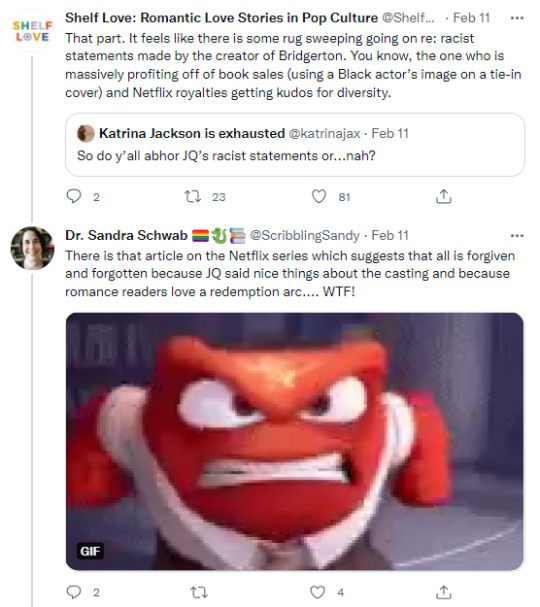
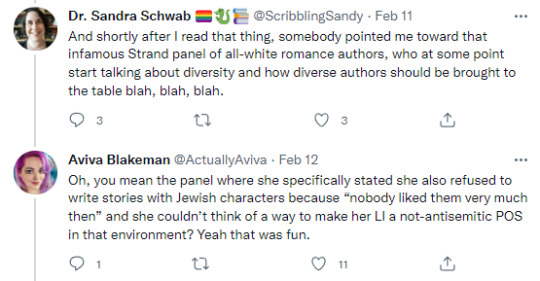
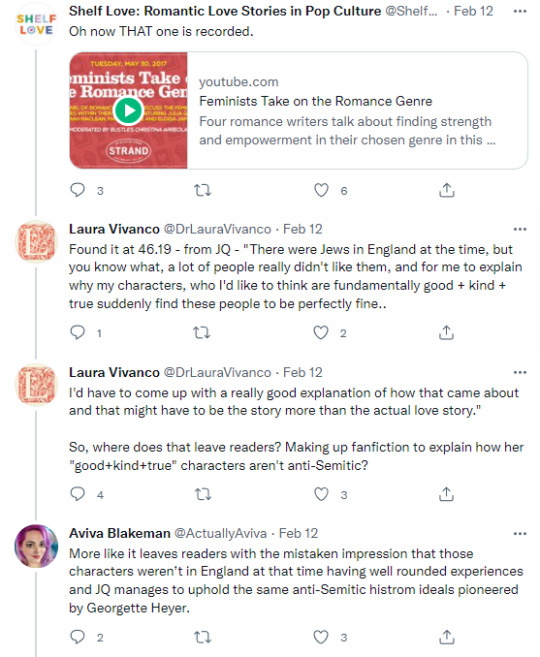
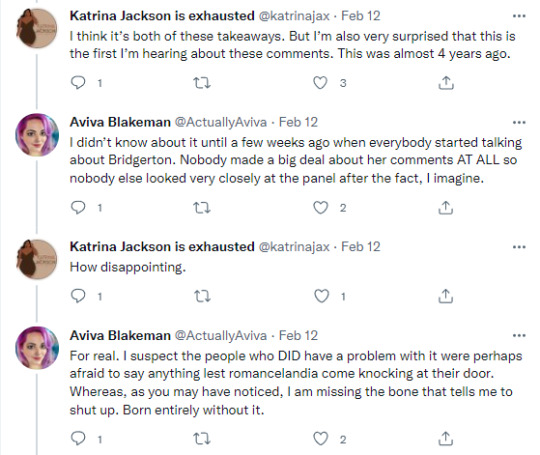
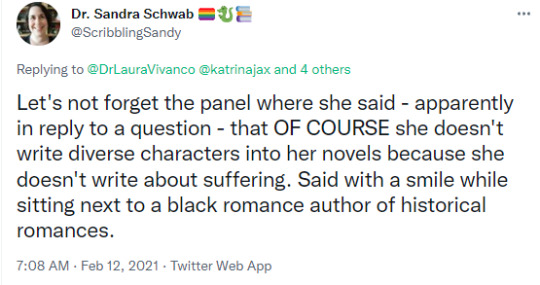
Are supposed to believe that this excuse is enough to explain the reason why she didn't include a single POC character on her books? Specially when there are historical novel's authors who do it? Does someone's religion and/or color impact your story so much that you feel the need to erase and pretend they don't exist for the sake of your 'love story'?
Sexism isn't sexy
My second issue with this book is, as you've just read, sexism. And it appears in so many forms that I honestly don't know where to start from.
In the first pages of the book, we are introduced to Daphne, and she expresses how difficult it is to find a suitor because they see her as a friend and not as a romantic partner. There could've been many ways to make Daphne more relatable using this premise, but of course Quinn decided to use the 'not like other girls' trope — or, as one of the guys Daphne was interested in says: "You are not like regular females, Daff."
The problem with this trope is that it implies that you, as woman, are inferior by default. It compares you to this stereotype that women are unintelligent and superficial, in contrast to men who are intelligent and value culture over makeup. It's like saying that you have the same qualities as a man, so you are superior to other girls who have stereotypically feminine habits and interests.
Quinn uses this trope in order to make Daphne stand out and show she's more appealing and relevant than her peers. And with this I mean how pleasing she is to the male gaze, as one of their own, as opposed to the other girls who are seen as hysterical and superficial. This is further emphasized by Daphne who constantly feels the need to remind everyone that she has a lot brothers and is different from other girls because she grew up with them.
Nevertheless, this is not the only thing that shows how sexist the characters are. Penelope, one of my favourite characters, is always described in this book as a horrendously ugly fat girl. I haven't read the other eight books, so I don't really know if Quinn develops this in the following volumes, but it just doesn't sit right with me. They criticize her clothes, even though they know she doesn't have a choice, and they point out how she won't find a husband because she's fat. Daphne sees this and although she pities her, she doesn't do anything. No one does anything while she's being publicly ridiculed.
Is this really what Julia Quinn wants to pass onto other women? That if they do not have a socially accepted body type and lived in those times they would be bullied, abused and ridiculed? That they would never be the main character? You could argue that Quinn changes this in the following books, but that doesn't change how badly someone might feel when reading this one.
Finally, to end this section, I will say that all men in this book are assholes. Simon? An asshole. Anthony? An asshole. Benedict? An asshole. Collin? An asshole. I think the only man who's not an asshole is the father of the Bridgertons, because he's dead so he can't talk.
Simon is, in my opinion, the worst of them, and the TV show literally saved him, because the book pictures him as a complete sexist, self-centered ignorant fool. He describes himself as a predator, who seems to not be able to control himself, and compares looking for a wife to "shopping for dogs." And it gets worse. He constantly speaks and thinks of women as superficial and hysterical beings who are dumb beyond compare, like they are a burden and a hassle for him to deal with. Is this really the character I'm supposed to empathize with?
TRIGGER WARNING: DESCRIPTION OF ABUSE AND RAPE AHEAD, PLEASE SKIP THIS PART IF THAT IS TRIGGERING FOR YOU
The R*pe Scene
This one is, without any doubt, the part I hated the most and what made me rate this book 1 star. I would rate it zero if I could, but sadly that's impossible.
So, as we all know, Simon had a very unfortunate childhood. His father was obsessed with continuing his bloodline and pressured his wife into getting pregnant. However, his wife had been pregnant 5 times - 3 times she had miscarriages and the other two times the children were stillborn. The doctors said she was too frail, too weak and perhaps too old to bear a child, "[...] but the duchess, God bless her, knew her role in life and after a six-month recuperative period, she opened the connecting door between their bedrooms and the duke once again commenced his quest for a son".
Basically, having a son was the duchess' role in life and she was obligated to it, while for the duke it was a quest, a mission he had to carry out. While this was true and it is an accurate description of the time, it implied that neither the duchess nor the duke had a son out of their own free will, but because of duty and social pressure, which was bound to traumatize Simon as he grew up, regardless of his circumstances.
As soon as Simon is born, the duke takes him away from the dying duchess and tells him "You are perfect. You are a Basset. You are mine", which reflects how he refused to accept his son as anything other than perfect, and how stuck he was on the idea of him being part of his property and legacy.
We have a lot of issues here already, but then the duke discovers that Simon finds it difficult to speak fluently and often stutters as a result. Noticing that, his father calls him a 'moron', an 'idiot', a 'half-wit' and a 'bloody little idiot', proceeding on beating and neglecting him for the next years. This, for obvious reasons, completely traumatized Simon, who vowed to make his bloodline end with him by refusing to get married and never siring an heir. He left the country and only came back after his father died, which only further emphasizes how much he had suffered.
When Simon marries Daphne, he uses her naivety and her lack of knowledge against her, by making her believe he wasn't able to have children.
"I can't have children."
There. He'd done it. And it was almost the truth.
Daphne's lips parted, but other than that, there was no indication that she'd even heard him.
He knew his words would be brutal, but he saw no other way to force her understanding. "If you marry me, you will never have children. You will never hold a baby in your arms and know it is yours, that you created it in love. You will never—"
"How do you know?" She interrupted, her voice flat and unnaturally loud.
"I just do."
"But—"
"I cannot have children." he repeated cruelly. "You need to understand that."
Later, however, Daphne ends up discovering that it was not that he could not have children but that he wouldn't. A normal couple would probably have a conversation. Simon and Daphne are not a normal couple.
Instead, Daphne decides to make use of the fact he returns home drunk, begging her not to leave him.
Daphne felt the strangest, most intoxicating surge of power. He was in her control, she realized. He was asleep, and probably still more than a little bit drunk, and she could do whatever she wanted with him.
She could have whatever she wanted.
A quick glance at his face told her that he was still sleeping... She felt so powerful looming over him... His eyes pinned upon her with a strange, pleading sort of look, and he made a feeble attempt to pull away. Daphne bore down on him with all her might... She planted her hands underneath him, using all of her strength to hold him against her.
Simon is described to be traumatized by what just happened, with "This complete loss of speech, this choking, strangling feeling — He had worked his entire life to escape it, and now she had brought it back with a vengeance."
END OF THE DESCRIPTION OF THE R*PE SCENE
I am being serious when I question how this part of the book, in particular, managed to be approved and published. Forcing your unwilling partner to have sex with you is not, under any circumstances, okay. Non-consensual sex should never happen, although we unfortunately know it continues to.
When you write this sort of disgusting act and violation of trust between two parties in a relationship, you have to be able to take full responsibility for it. Quinn had the duty of exploring this issue, of talking in depth about it, of showing how the characters — and their relationship, for that matter — got through it. By failing to do that, she normalized it and passed it onto her readers, who might start thinking of it as a normal thing.
If I had ever been in Simon's situation I would never be the same. I wouldn't be able to trust Daphne anymore. I'm not even sure if I, in his place, would love her after that. But Quinn simply dismissed this as the last hurdle the couple had to face before living happily ever after (with the kid they have in the future).
Perhaps you could argue that Daphne apologized, but is that really enough? Does someone who violated you and ignores your boundaries deserve to be forgiven after a little apology? I don't think so.
This book gained a 1 star rating from me, and I wish I could give it even less, for all it was worth.
LINKS:
Laura Vivanco's article: https://www.vivanco.me.uk/blog
Twitter thread: https://twitter.com/ShelfLovePod/status/1359962674096988160
#bridgerton#bridgerton netflix#bridgerton siblings#violet bridgerton#daphne and simon#simon basset#anthony bridgerton#collin bridgerton#penelope featherington#authors#julia quinn#books#booklr#book review#1 star book#worst books#extensive book review#long book review#the tea#the tea was served#netflix#netflix series#netflix original#tv show#tv series#book blog#thebookchaosreviews
78 notes
·
View notes
Text
me, reading serpent and dove: so sarah j. maas supposedly loves this book... that's sus...
serpent and dove: big titty liddy was not very pretty, but her bosom was big as a barn. her creamery knockers drove men off their rockers, but she was blind to their charms. big willy billy talked sort of silly, but his knob was as long as his arm-
me: oh. OH.
#fantasy#sarah j. maas#romance#reading#novel#ya books#young adult#serpent and dove#enemies to lovers#bookworm#book#booklr#bookaddict#books & libraries
22 notes
·
View notes
